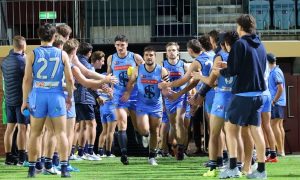The nationwide R U OK? ‘Trust the Signs Tour’ will visit Adelaide today joined by R U OK? Community Ambassadors and local support services.
R U OK? is encouraging the Adelaide community to come down to The Plaza, Flinders University from 12:00 – 1:30pm for a free feed, activities for all ages and a chance to learn more about navigating a conversation with someone you’re worried about.
The ‘Trust the Signs Tour’ comes in the wake of research released by R U OK? that found:
- Nearly two-thirds of Australians (63%) are not confident they know the signs that someone might be struggling with life.
- Of those surveyed, 41% hadn’t asked someone if they were OK because they weren’t sure they knew the signs.
- However, there is hope, with almost 1 in 2 (49%) believing they’d be more confident starting a conversation if they knew the signs.
The Tour is travelling around 14,000 kilometres visiting every state and territory and engaging 24 communities in an educational experience.
R U OK? CEO Katherine Newton says the Tour aims to build confidence in recognising when someone might be struggling so that Australians ‘Trust the Signs, Trust their Gut and Ask R U OK?’.
“We know the majority of Australians believe talking to someone who’s struggling can make a difference. But what we’re hearing, is that people aren’t sure when the right time is to have an R U OK? conversation,” said Newton.
“Signs can be subtle changes in verbal or non-verbal behaviour. A loved one might tell you they’re having difficulty switching off or a mate might be withdrawing from social situations like not turning up to training. We’re encouraging people to look out for those cues. We can also make a conscious effort when we know someone is going through a significant life change such as job loss, relationship breakdown, study pressure or perhaps becoming a parent.”
“By taking the ‘Trust the Signs Tour’ around Australia, we hope to empower people to trust their gut instinct and ask the question as soon as they spot the signs that someone might be struggling with life.”
This is the sixth consecutive year R U OK? has hit the road. This year the Tour involves two dozen communities that have reached out for an R U OK? visit.
The Adelaide community will hear from R U OK? Community Ambassadors Anthony Hart and Chris Savill. Chris has a strong lived experience, having experienced severe depression brought on through workplace stress. Chris is passionate about raising awareness of depression and volunteers his time helping youth through their struggles.
Importantly each event on the ‘Trust the Signs Tour’ will highlight local mental health support services, volunteer organisations and Suicide Prevention Networks ensuring those attending are aware of the existing services available in their community for the times an R U OK? conversation is too big for friends and family alone.
The ‘Trust the Signs Tour’ will complete its journey in Sydney on 12 September to coincide with R U OK?Day, a national day of action marked with events around the country.
Ambassadors, including Barry Du Bois, Travis Collins, Barry Conrad, Tom Derickx, Casey Donovan, Bianca Dye, Chris Green, Bruce ‘Hoppo’ Hopkins, Rachael Lynch, Miguel Maestre, Ben Ross and Steve ‘Commando’ Willis, have thrown their support behind the ‘Trust the Signs Tour’.
R U OK? is encouraging all Australians to learn the signs, download a practical toolkit and start regular meaningful conversations throughout their communities when its needed.
More information on how to get involved can be found at: ruok.org.au
For support at any time of day or night, call Lifeline on 13 11 14.
What are the signs?
| What they might say: | What they might do: | What might be going on in their life: |
| Things that sound more confused or irrational | Change their mood or experience extreme mood swings | Relationship breakdown |
| Things that indicate a persistent drop in mood | Withdraw or avoid friends, family or social situations | Major health issues |
| Complain they have difficulty switching off | Change their online behaviour | Work or home stress |
| They are struggling to see a future | Not enjoy hobbies or interests they once did | Financial difficulty |
| They believe they’re a burden on others | Have difficulty concentrating | Study pressures |
| They feel worthless or alone | Lose interest in maintaining personal hygiene or appearance | Loss of someone or something they care about |
| They feel trapped or unbearable pain | Behave recklessly, including increasing alcohol or drug use | |
| Talk about death, suicide and wanting to die | Change their sleep pattern | |





















